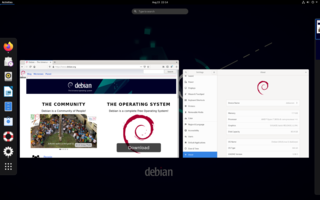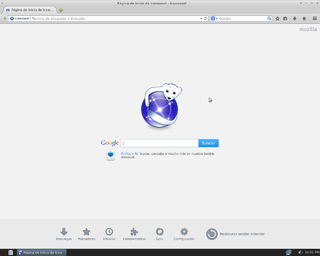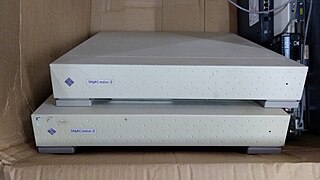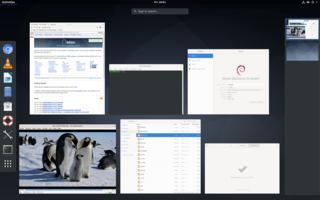Related Research Articles

Debian, also known as Debian GNU/Linux, is a Linux distribution composed of free and open-source software, developed by the community-supported Debian Project, which was established by Ian Murdock on August 16, 1993. The first version of Debian (0.01) was released on September 15, 1993, and its first stable version (1.1) was released on June 17, 1996. The Debian Stable branch is the most popular edition for personal computers and servers. Debian is also the basis for many other distributions, most notably Ubuntu.

GNU is an extensive collection of free software, which can be used as an operating system or can be used in parts with other operating systems. The use of the completed GNU tools led to the family of operating systems popularly known as Linux. Most of GNU is licensed under the GNU Project's own General Public License (GPL).

The GNU C Library, commonly known as glibc, is the GNU Project's implementation of the C standard library. Despite its name, it now also directly supports C++. It was started in the 1980s by the Free Software Foundation (FSF) for the GNU operating system.

Within the free software and the open-source software communities there is controversy over whether to refer to computer operating systems that use a combination of GNU software and the Linux kernel as "GNU/Linux" or "Linux" systems.
Technical variations of Linux distributions include support for different hardware devices and systems or software package configurations. Organizational differences may be motivated by historical reasons. Other criteria include security, including how quickly security upgrades are available; ease of package management; and number of packages available.

In 2006, a branding issue developed when Mike Connor, representing the Mozilla Corporation, requested that the Debian Project comply with Mozilla standards for use of the Thunderbird trademark when redistributing the Thunderbird software. At issue were modifications not approved by the Mozilla Foundation, when the name for the software remained the same.

Musix GNU+Linux is a discontinued live CD and DVD Linux distribution for the IA-32 processor family based on Debian. It contained a collection of software for audio production, graphic design, video editing and general purpose applications. The initiator and co-director of the project was Marcos Germán Guglielmetti.

Linux is a family of open-source Unix-like operating systems based on the Linux kernel, an operating system kernel first released on September 17, 1991, by Linus Torvalds. Linux is typically packaged as a Linux distribution, which includes the kernel and supporting system software and libraries, many of which are provided by the GNU Project. Many Linux distributions use the word "Linux" in their name, but the Free Software Foundation uses the name "GNU/Linux" to emphasize the importance of GNU software, causing some controversy.

gNewSense was a Linux distribution, active from 2006 to 2016. It was based on Debian, and developed with sponsorship from the Free Software Foundation. Its goal was user-friendliness, but with all proprietary and non-free software removed. The Free Software Foundation considered gNewSense to be composed entirely of free software.

The SPARCstation 2, or SS2 is a SPARC workstation computer sold by Sun Microsystems. It is based on the sun4c architecture, and is implemented in a pizza box form factor.
GNU variants are operating systems based upon the GNU operating system. According to the GNU project and others, these also include most operating systems using the Linux kernel and a few others using BSD-based kernels.

GNU IceCat, formerly known as GNU IceWeasel, is a completely free version of the Mozilla Firefox web browser distributed by the GNU Project. It is compatible with Linux, Windows, Android and macOS.
Parsix GNU/Linux was a live-CD Linux distribution based on Debian. The Parsix project's goal was to provide a ready-to-use, easy-to-install, desktop and laptop-optimized operating system based on Debian's testing branch and the latest stable release of GNOME. It was possible to install extra software packages from the project's own APT repositories.

The SheevaPlug is a "plug computer" designed to allow standard computing features in as small a space as possible.

Linux-libre is a modified version of the Linux kernel that contains no binary blobs, obfuscated code, or code released under proprietary licenses. In the Linux kernel, they are mostly used for proprietary firmware images. While generally redistributable, binary blobs do not give the user the freedom to audit, modify, or, consequently, redistribute their modified versions. The GNU Project keeps Linux-libre in synchronization with the mainline Linux kernel.

Debian releases do not follow a fixed schedule. Recent releases have been made roughly biennially by the Debian Project. The most recent version of Debian is Debian version 11, codename "Bullseye". The next up and coming release of Debian is Debian 12 codename "Bookworm".

Devuan is a fork of the Debian Linux distribution that uses sysvinit, runit or OpenRC instead of systemd. Devuan aims to avoid "lock-in" by projects like systemd and aims to maintain compatibility with other init systems to avoid detaching Linux from other Unix systems.

PureOS is a Linux distribution focusing on privacy and security, using the GNOME desktop environment. It is maintained by Purism for use in the company's Librem laptop computers as well as the Librem 5 smartphone.

Hyperbola GNU/Linux-libre is a Linux distribution for the i686 and x86-64 architectures. It is based on Arch Linux snapshots and Debian development. It includes the GNU operating system components and the Linux-libre kernel instead of the generic Linux kernel. Hyperbola GNU/Linux-libre is listed by the Free Software Foundation as a completely free operating system, true to their Free System Distribution Guidelines.